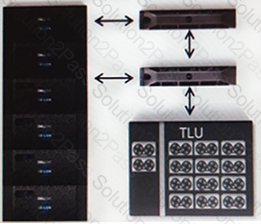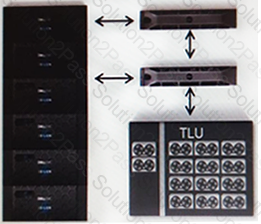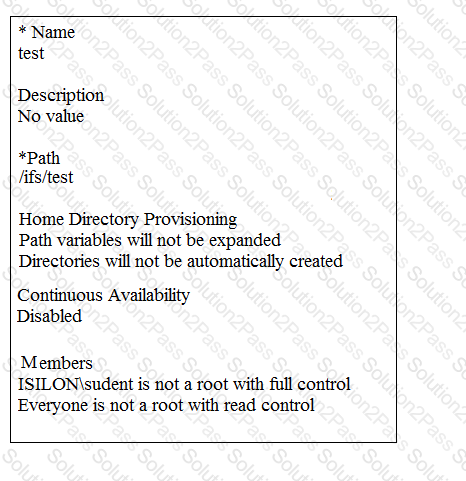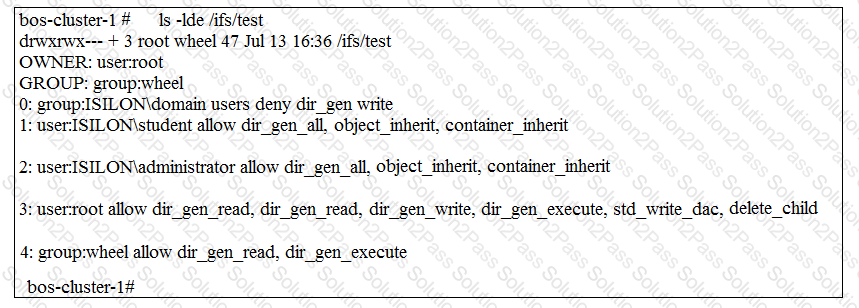DEE-1421 EMC Expert - Isilon Solutions Exam Free Practice Exam Questions (2026 Updated)
Prepare effectively for your EMC DEE-1421 Expert - Isilon Solutions Exam certification with our extensive collection of free, high-quality practice questions. Each question is designed to mirror the actual exam format and objectives, complete with comprehensive answers and detailed explanations. Our materials are regularly updated for 2026, ensuring you have the most current resources to build confidence and succeed on your first attempt.
SPECIAL INSTRUCTIONS
The remaining Part1 questions are associated with four case studies that describe various environments or settings. Each case study appears on its own display screen. Questions for each case study will appear on separate display screens.
When displaying a question, you can easily review the related case study by clicking on the “Review Case Study” icon shown below:

Case Study 5 – Refer to the Exhibit.
Backing up data from a Dell EMC Isilon cluster exceeds the company’s backup window. Because the company has a large amount of data with a continuous high growth rate, they want to change their backup strategy. The Gen 6 Isilon cluster consists of 24 nodes. Their current backup strategy is an NDMP three-way backup performing weekly full backups to tape and incremental backups each night. The strategy uses Dell EMC NetWorker. The DMA uses Include paths to specify what data to backup. All data on the cluster must remain accessible.
The company’s IT team is now looking for a new data protection strategy. The company wants to:
Minimize the backup window
Increase the speed of data recovery
Reduce the network traffic
Reduce the overall growth of the backup datasets
The IT Team indicates that their currently backup hardware will be used in any solution. Which solution meets their requirements?
A company has an environment with multiple AD forests in a one-way trust relationship. The AD provider on the cluster is configured with SFU. The trusted domains are failing to supply UIDs and GIDs to the Dell EMC Isilon cluster. As a result, users from the trusted domain are receiving an “access denied” error message.
What is a possible reason for the denial?
A Dell EMC Isilon cluster replicates critical production data and long-term archive data from the data center to a target cluster. The source cluster runs OneFS 8.1.1 and the target cluster runs OneFS 7.2. OneFS will not be upgraded on the target cluster.
When the archived data on the source cluster is replicated to the target cluster, the capacity consumption on the source cluster far exceeds what is expected. What is the reason for the increase in capacity consumption on the cluster?
Case Study 1
A company has several independent business units that operate globally. The company has consolidated its IT infrastructure services and operations. Common infrastructural services which include IPAM, DNS, NTP, DHCP, and SMTP have been consolidated. The company has complimented its infrastructure development by investing in Dell EMC Isilon clusters to host its user’s home and group directories and for compliance archival purposes required by individual business units.
The IT operations are located in India and the United States with its primary data center facilities co-located between New York and Texas. The company has a total of 60 AD forests:
1 main domain
55 domains have one-way trust relationships with the main domain
An additional 4 domains do not have any trust relationship with no future plans of establishing trust relationships with the other domains.
Users of different AD domains use different FQDN to access their corresponding file services. Additionally, the company does not plan to consolidate the AD domains and each domain uses a different IP subnet. The users of the domains with no trust relationships have a compliance archival requirement. The company wants to all data to be replicated between New York and Texas.
What is the minimum number of replication policies that are required to facilitate granular failover and failback capabilities for each AD domain?
SPECIAL INSTRUCTIONS
The remaining Part1 questions are associated with four case studies that describe various environments or settings. Each case study appears on its own display screen. Questions for each case study will appear on separate display screens.
When displaying a question, you can easily review the related case study by clicking on the “Review Case Study” icon shown below:

Case Study 5 – Refer to the Exhibit.
Backing up data from a Dell EMC Isilon cluster exceeds the company’s backup window. Because the company has a large amount of data with a continuous high growth rate, they want to change their backup strategy. The Gen 6 Isilon cluster consists of 24 nodes.
Their current backup strategy is an NDMP three-way backup performing weekly full backups to tape and incremental backups each night. The strategy uses Dell EMC NetWorker. The DMA uses Include paths to specify what data to backup. All data on the cluster must remain accessible.
The company’s IT team is now looking for a method to increase the performance of their backups. After some investigation, you notice that the backup job targets two paths. This could be the cause of the lengthy backup times.
What advice should be provided to the team?
A Dell EMC Isilon administrator has set up security on a share as shown in the exhibit. Users in the group entitled “domain users” should only be allowed read access to the share. Which user or group is able to only read from the share called “test”?


You have just configured a Dell EMC Isilon cluster. One of the remaining tasks is to enable alert notification. The cluster is on a network segment behind a firewall for security. You have determined which node is the CELOG master and have enabled connectivity between it and the ESRS gateway.
Testing shows that alerts were working for several days but have suddenly stopped. Which action is required to resolve this issue?
A company plans to deploy N+2d:1n protection on a 7-node Dell EMC Isilon cluster. How much capacity will be used to store a 1536 KB file?
A company has a Dell EMC Isilon cluster that will be used for a large amount of client requests. SmartConnect has been configured to help load balance the clients across the cluster. How does SmartConnect help the load balancing?
Case Study 3
A financial services company has file sharing workflows and 2000 home directories which include 70% Microsoft Windows and 30% Linux. The Security team is also interested in credit card usage data analytics such as point of sale, geolocation, and authorization and transaction data. Home directories and file shares do not require D@RE or SEC compliance.
However, due to the sensitivity of the credit card data, the company requires D@RE for credit card information and must adhere to the U.S. SEC 17a-4(f) compliance standards. Additionally, they are interested in auditing user access and anti-virus features.
The compute and storage environment consists of the following:
200 TB of Fibre Channel drives on NetApp ONTAP 7
Environment is expected to grow 200 TB over the next three years
In order to remove the encryption key on the SED drives, which steps are required?
Case Study 4
A company is experiencing a noticeable decrease in performance when accessing data on their Dell EMC Isilon cluster. The cluster hosts Microsoft Windows home directories and general purpose file shares. In addition, a file pool policy moves data that has not been modified in six months to an achieve tier. The administrator wants your assistance in understanding the reason for the slow data access. The number of users accessing the cluster has not changed. The administrator has shared the following baseline metrics. The outputs were captured from a performance- acceptable time frame.
Trace route shows:
-3 hops between clients and the cluster
-Average latency is 3 ms
Iperf shows:
-940 Mb/s average bandwidth
-005 ms average jitter
Netstat on the local network shows:
-05% average re-transmission rate
Hostcache list:
-20 ms average roundtrip time across all clients
The administrator shows you the details of the hostcahce.list output. The output indicates that the top clients on the list have an average of 242 ms round trip time. Based on the output, what information should be provided to the administrator?
A company is planning to replicate a dataset to a newly implemented Dell EMC Isilon cluster. SyncIQ will be used from the source cluster to the target cluster. The company’s systems administrator wants to know how long the initial synchronization will take without seeding. The administrator provides the following information:
Link speed between clusters is 1 Gb/s
Link speed efficiency is 85%
SyncIQ domain size is 125TB
If no SyncIQ performance rules are set, what is the estimated number of days?
An IT team is preparing to replicate a dataset from their existing primary Dell EMC Isilon cluster to a secondary cluster. Both clusters are licensed for SmartLock Enterprise and SyncIQ is used for replication. The source directory is a SmartLock directory and the target directory must be a SmartLock directory.
When consulting with the IT team, what is a key consideration before running the replication policy?
A Microsoft Windows administrator has an environment that includes a 4-node Dell EMC Isilon H500 cluster with one subnet and two pools. The administrator will use SMBv3 in all their clients. One pool is for production using 10gige- 1 and 10gige-2 ports from each node. The other pool is for management using mgmt-1 from each node.
One of the concerns is the network throughput and how the administrator can get more than 10GbE throughput on the production pool on each node. Which recommendation should be provided?
A company is planning to add eight additional nodes to their existing 4-node Dell EMC Isilon cluster. If the administrator plans to add all eight nodes at the same time without causing any outage, what is the result of this action?
A company is migrating files from a third-party storage platform that is authenticated through AD. The migration tool being used is Dell EMC “EMCOPY.exe” running on a separate Microsoft Windows host. In order to run the EMCopy process and complete the migration, which type of account is required?
A company has purchased a new Dell EMC Isilon cluster as a disaster recovery solution and plans to use SyncIQ. SBR is not currently enabled. The systems administrator has asked for advice about how to configure the network connectivity for the replication traffic.
What are Dell EMC recommendations for a replication network configuration?
